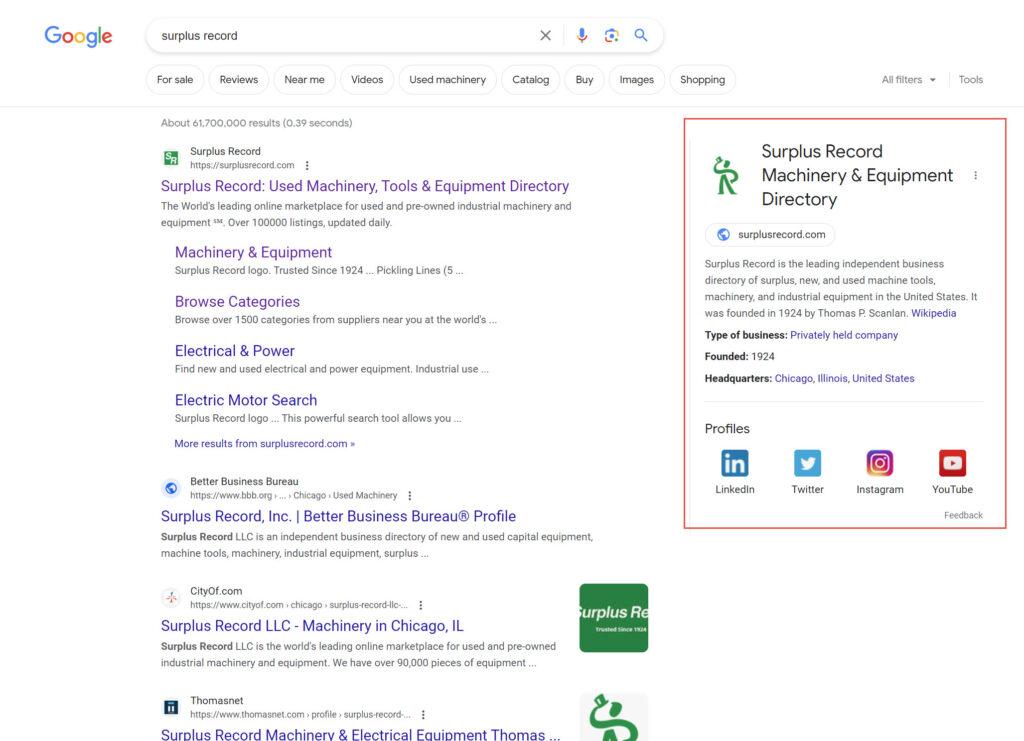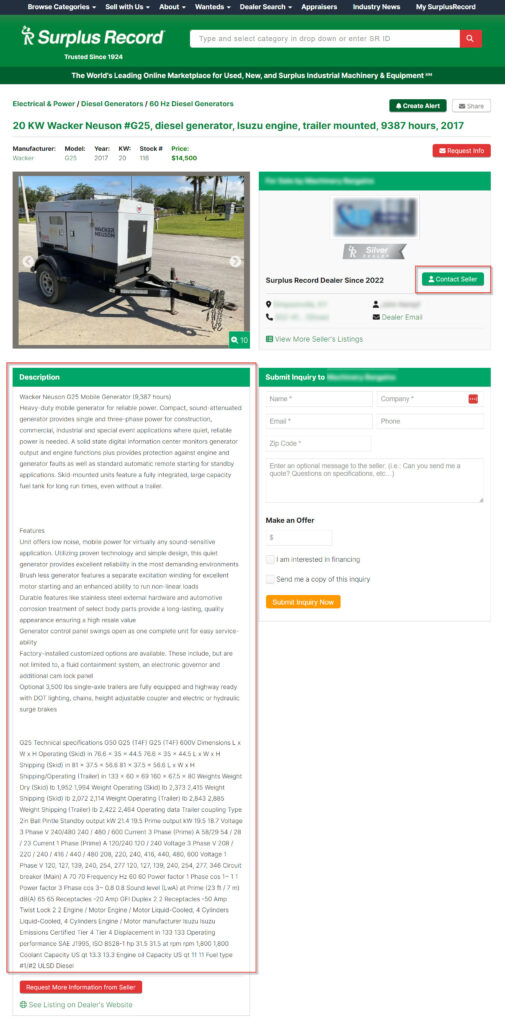In the bustling world of used machinery and equipment sales, the opportunities are vast, but so too are the risks. As the number of online listings continue to grow, buyers and sellers are faced with the challenge of navigating potential pitfalls, especially scams that could threaten their investments.
Whether you’re a seasoned dealer or a newcomer to the realm of machinery and industrial equipment, it’s essential to arm yourself with knowledge. This guide aims to equip you with the best practices and insights to ensure every transaction you undertake is safe, transparent, and scam-free. And if you’re looking to sell your machinery with peace of mind, consider leveraging Surplus Record’s trusted platform—a haven for secure and straightforward equipment transactions.
Tips for Sellers
Navigating the realm of equipment sales can be difficult, especially when the digital landscape poses various risks. Here’s a closer look at some of the measures sellers should take to ensure a secure transaction:
Don’t Fall for Phony Wires to your Bank Account
- Wiring Money: One of the most common scams people will try and pull is “wiring” you the price for your equipment but it’s actually a check or money order or cashiers check. So the money looks like it’s in your account, but if you call and verify with your bank, it will be “pending” and likely it will never finalize. The scammer will then make an excuse that they wired you too much money or they changed their mind and only want 1 of the 2 things you were going to sell etc… So they will ask you to wire back half the money back to them, but the wire you do will be your actual money from your bank account, not theirs, and you will lose that money.
- Logistics Scam: Another variation of this is they will wire you extra money for “shipping” but they then want you to wire that extra money for shipping to their “logistics” company so you pay for it, not them. Again, the money you wire will be lost forever.
Don’t Fall for Phishing and Social Engineering
- Be Skeptical: Always double-check emails or messages that request personal information, payment details, Purchase Orders, or any other sensitive data. Scammers often mimic official correspondence to deceive unsuspecting victims. (For example, a common Phishing scam is to send an email saying please see attached for your invoice or PO, and it’s a link or HTML file that makes it look like it requires a login but it’s just there to steal whatever email/password you type in)
- Stay Informed: Regularly update yourself on the latest phishing tactics and consider training sessions if you’re part of a larger organization. Some coming phishing tactics include:
- Deceptive Emails: Disguised as legitimate communications from banks, service providers, or even colleagues.
- Fake Websites: Mimicking real websites to capture your login or payment details.
- Suspicious Attachments: Emails with malicious software hidden in attachments.
- Urgent Requests: Pressuring you to act quickly, often with threats or too-good-to-be-true offers.
- Links in Emails: Encouraging you to click, leading to malicious sites.
- Mobile Phishing: SMS or messaging apps urging you to share sensitive info.
Use Caution with Out-of-Area Buyers, Especially International
- Know the Risks: Transactions involving buyers from overseas comes with it’s own set of risks. If its not a company with a large presence online or a strong history, be very careful when dealing with international deals, and we recommend you use an Escrow service whenever possible so there’s no risk of wire fraud.
- Opt for Secure Payments: Always ensure that payments are made via trusted platforms or escrow services such as as a trusted and vetted escrow service where a 3rd party verifies both the buyer and seller are who they claim they are, and they will hold the funds until the equipment is received from the seller.
Verify the Buyer’s Details and Transaction
- Do Your Homework: Before finalizing any deal, take the time to research the buyer. Verify their credentials, past purchase history, or even request references.
- Get Everything in Writing: Always insist on a written agreement or invoice detailing the transaction’s specifics. This serves as a legal safeguard should disputes arise.
Look for Any Details That Can Be Off
- Trust Your Instincts: If something feels amiss—whether it’s an odd request, an inconsistency in communication, or a too-good-to-be-true offer—pause and assess. Some examples to watch out for include requests for your personal info, inaccurate website domains or domains that redirect you elsewhere, excessive typos, misleading links and unofficial “from” email addresses.
- Seek Second Opinions: If you’re uncertain about a potential buyer or transaction, consult your peers or industry forums. Collective experience can often spot red flags you might have missed.
- No Negotiation – If the buyer barely negotiates and just accepts your first price without any questions or asking to see videos of the machine or details, it’s usually a scam.
- Quick Speed – If they are asking to move very quickly and trying to get you to wire money quickly or making up stories about how this has to be urgent, it’s usually a scam.
By adopting these measures and always prioritizing safety, sellers can confidently navigate the machinery sales landscape, ensuring not just profitable, but also secure transactions.
Tips for Buyers and Avoiding Scams
For buyers in the equipment and machinery marketplace, the thrill of finding the right piece of equipment can sometimes overshadow potential risks. However, staying vigilant and informed can ensure that your purchasing experience is both smooth and safe. Here are some pivotal tips for buyers to steer clear of scams:
Shop Around and Avoid Listings That Are Too Good to Be True
- Realistic Expectations: If a deal seems too favorable, it may be a red flag. Compare prices across multiple platforms to get a sense of the market rate for the machinery in question.
- Ask Questions: Engage with sellers to understand the reasoning behind unusually low prices. Genuine sellers will provide logical explanations like liquidation sales or equipment age. Other common questions you may want to ask your seller are:
- Are you familiar with the history of this machine?
- How many hours has this machine been in operation?
- How does this machine stack up against its newer model?
- Have you conducted an inspection of the machine?
- May I view the maintenance and service records for the machine?
- What’s the working capacity of this machine?
- Are there any warranties provided with the machine?
Research and Verify the Seller
- Due Diligence: Before proceeding with a purchase, investigate the seller’s background. Check their website (if available), company registration, and other business credentials.
- Engage Directly: A direct conversation can offer insights into the seller’s legitimacy. Avoid sellers who are evasive or provide inconsistent information.

Look for Reviews and History
- Feedback Matters: Previous buyers’ experiences can be a goldmine of information. Look for reviews, ratings, or testimonials, if possible. A history of positive transactions can be reassuring.
- Be Skeptical: Single, overly glowing reviews or a complete absence of feedback might be cause for caution.
- Warning of Fake Dealer Websites: Some scammers will create a legitimate looking website with machines for sale, but everything is fake. One obvious sign of this is if you do a Domain Lookup on their website and see that it was just Registered on a date within the past year or few months.
Make Sure the Title is Clear
- Ownership Verification: Ensure that the seller truly owns the equipment and that it’s free from any liens or outstanding debts. You can conduct a lien search under the Universal Commercial Code through your state’s Secretary of State website. The search must be completed in the county or state where the current owner resides (not where the sale will be finalized).
- Documentation: Always request proof of ownership and other relevant paperwork to avoid potential legal entanglements later.
Always Inspect Equipment Before Purchase
- Physical Verification or Video: Whenever possible, visit the location to inspect the machinery. This ensures you’re getting what’s advertised and can assess the equipment’s condition firsthand. If you have a friend in the area that can go inspect it and make a video that goes a long way too.
- Consider Professionals: If you can’t inspect the machinery yourself, consider hiring a professional appraiser or technician to do it on your behalf.
Have a Paper Trail
- Record Keeping: Maintain documentation of all communications, transactions, and agreements. This not only aids in future reference but also offers protection in case of disputes or misunderstandings.
- Transparent Transactions: Always insist on clear invoices, receipts, and other essential documents that outline the terms of the sale.
By keeping these principles in mind and always prioritizing diligence over haste, buyers can confidently navigate the equipment marketplace, ensuring they secure genuine deals and avoid potential pitfalls.
How to Buy Used Equipment Online
The internet has revolutionized the way we buy and sell, making it easier than ever to access a world of used equipment. However, purchasing machinery online presents its own set of challenges. Here’s a step-by-step guide to help you navigate the online world of used equipment purchasing with confidence:
Determine Your Needs
- Specifics Matter: Before diving into listings, identify the exact type, model, and specifications of the equipment you need. This helps narrow down your search and ensures you buy machinery that aligns with your requirements.
- Set a Budget: Establish a clear budget that takes into account the equipment’s cost, potential shipping, taxes, and any additional costs like installation or maintenance.
Choose a Reputable Platform
- Do Your Research: Opt for well-known platforms or marketplaces with a track record of reliable transactions. Look for sites that offer buyer protections or vet their sellers.
- Read Reviews: User reviews and testimonials can give insight into the platform’s reliability and customer service.
Browse Listings
- Detailed Descriptions: Focus on listings that offer comprehensive descriptions, clear photos, and preferably videos of the machinery in operation.
- Compare: Don’t rush into a purchase. Compare multiple listings to get an idea of the average condition and price of the equipment you’re seeking.

Check Payment and Delivery Terms
- Secure Payment: Prioritize platforms or sellers that offer secure payment methods, such as escrow services or credit card transactions.
- Understand Delivery: Be clear on shipping costs, delivery timelines, and who bears the responsibility for any damage during transit.
Engage with Sellers
- Ask Questions: Don’t hesitate to reach out to sellers for additional information or clarifications about the equipment.
- Negotiate: Many sellers are open to negotiation. Discuss the price, payment terms, and other details to arrive at a mutually beneficial agreement.
Finalize the Purchase
- Documentation: Ensure you receive all necessary documents, such as the title, manuals, maintenance records, and a purchase receipt.
- Inspection upon Arrival: Once the equipment arrives, inspect it thoroughly to ensure it matches the description and operates as expected.
Buying used equipment online doesn’t have to be daunting. By following these steps and maintaining a proactive approach, you can secure quality machinery that suits your needs. To further ensure a hassle-free experience, consider using Surplus Record. As one of the leading platforms for industrial equipment, we pride ourselves on our verified listings and trusted community of buyers and sellers. Enjoy the convenience and expansive options the online marketplace offers, and start your equipment search with Surplus Record today!

